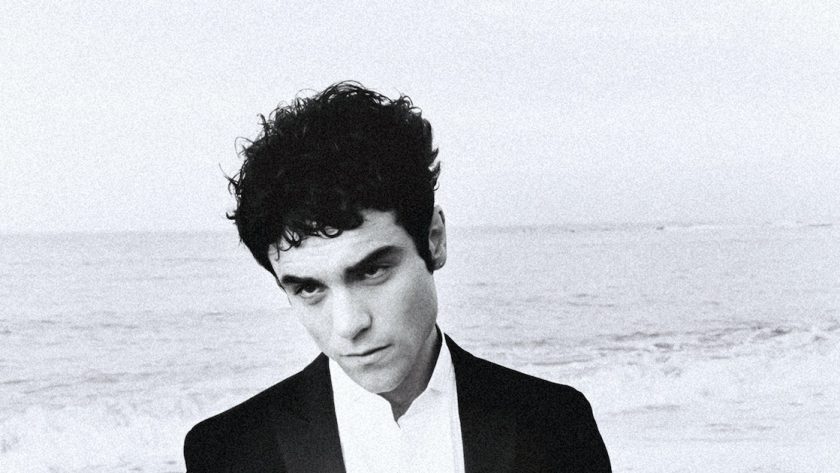There are three key moments S. Holden Jaffe can point to that proved things were changing—that people were paying attention to his music, which he releases under the name Del Water Gap, differently (and more) than before. The first was during summer 2020, in an event that has since become a famous bit of Del Water Gap lore. His song “Ode to a Conversation Stuck in Your Throat” had come out several months prior, to little fanfare. Jaffe puts it even more bluntly: “The release had pretty much flopped,” he says. He was considering quitting music—and had even begun calling friends and peers to let them know he was going to pursue some other career.
But then the actors Kaitlyn Dever and Margaret Qualley posted a video of themselves dancing in split screen to “Ode to a Conversation.” The video went viral; the song has since reached 75 million streams on Spotify alone. The attention allowed him to sign a new record deal and finish his self-titled debut, which came out in late 2021. “It was a huge mess, then all of a sudden it all focused,” he tells me. “And it was off to the races.”
The second moment was in early 2022, when he made his television debut playing “Ode to a Conversation” on Late Night With Seth Meyers. (Later that same night, he would play his own, sold-out show in New York.) The third was touring with Girl in Red in Europe and headlining a tour in Australia.
“The line always shifts as far as what feels normal,” he says, but in hindsight, certain moments offer evidence that something has changed. In some ways, this is the subject of his sophomore record, I Miss You Already + I Haven’t Left Yet, which comes out at the end of September: putting words to an inchoate feeling of liminality and transition. Across the album’s 12 songs, Jaffe’s narrator develops a relationship in hotel rooms (“All We Ever Do Is Talk”); navigates the space between attraction and commitment (“Doll House,” “We Will Never Be Like Anybody Else”); and processes returning from tour (“Quilt of Steam,” written with and featuring Arlo Parks). The title of the album, drawn from an inscription from his grandfather to his grandmother in a book of William Carlos Williams poetry, alludes to another kind of gap, the one between anticipation and action. At the same time, its frequently anthemic production makes songs about “the life that happens between the high-highs and the low-lows,” as Jaffe puts it, sound climactic.
Although it’s come into particular focus on the new record, this idea of becoming accustomed to uncertainty could also be one way to read Jaffe’s career as a whole. Music was not an entirely unprecedented path in his family—his grandfather was an executive at Columbia Masterworks, and a cousin is part of Kacey Musgraves’s band—but it wasn’t the obvious choice, either: his parents are academics, and his brother, two years older, is an environmental lawyer. “I grew up in a very pragmatic household,” he says. “I’ve always had a bit of trouble leaning into the unknown as a result.” When he began putting out music as Del Water Gap, in high school and then in earnest after college, he had to set aside some of those doubts. “You make an album hoping it will get to people,” he says, “but you also have to make an album in some ways with your back to the world, knowing that it has to be something that you love and you can stand behind.”
One thing that has bolstered his confidence is being part of an artist community. In the past three years alone, Jaffe, now 30, has put out music with Maggie Rogers (including co-writing and producing Surrender tracks “Want Want” and “Anywhere With You”), Samia (who appeared on his 2021 song “Alone Together”), and Claud (co-writing and producing their songs “Never Meant to Call” and “My Body”).
“The worst writing environments I find myself in is worrying that something’s not cool enough or an idea I have on the table isn’t good enough or feeling judged,” Claud tells me. “Holden’s just the opposite of that. There really is no bad or uncool idea.”
Still, I Miss You Already didn’t come easily. Because while what followed “Ode to a Conversation”—the shows and the knowledge that his music was reaching people—was thrilling, it was also exhausting. He was never in one place for long enough to feel like he had much stability; he would spend six weeks on tour and two weeks at home, and then he would leave again. It wasn’t easy to write while everything was moving. Two things offered him some sense of equilibrium: During the pandemic, he had gotten sober (and, consequently, really into distance running), and while touring he was also entering a new relationship. “Diving into a relationship as a place to hide and recharge is a beautiful thing, but I think in my case it added a lot of pressure,” Jaffe says.
He started going to the studio with a new producer, Sammy Witte, in February 2022. “I was doubting that I would be able to pull it off,” he says. “I’d never really had to write on the clock before.” During these sessions, some of the same experiences that felt like obstacles—the transience and instability—turned into material. “I came in when he was still figuring out the direction of the record and we pooled our two truths of being people who travel a lot and come back to a changed world every time,” Arlo Parks tells me. The “quiet in-between” moments of change that the record dwells in, she adds, “can be the biggest moments in our lives.” The record began to cohere.
When we spoke in the middle of September, Jaffe was already on the move again. The next day, he performed at the Flower Shop, a bar on Manhattan’s Lower East Side; by late afternoon, the line to enter wrapped around the block. (More proof of change: Jaffe came up playing small bar shows, but now he’s more accustomed to, say, selling out thousand-plus-cap venues.) Around 7:30 PM, Jaffe showed up with his guitar; a crowd clustered around him, blocking traffic on Eldridge Street as he began to play the opening chords to “Better Than I Know Myself,” a song he wrote with Claud. Drivers leaned on their car horns, momentarily drowning out his voice. A giggle rippled through the crowd. Jaffe just grinned, and kept playing.



